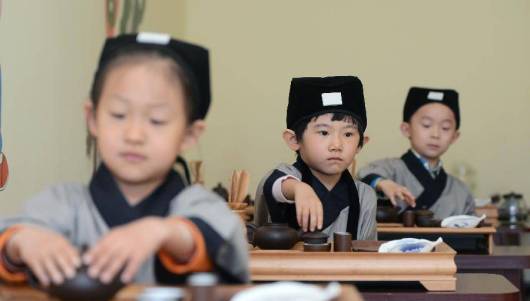Scholars shoulder responsibility in guiding guoxue
Author : Li Yongjie Source : Chinese Social Sciences Today 2014-09-11

Children learn rituals of a traditionalChinese tea ceremony at a school designated to teach children guoxue, or traditional Chinese cultural studies in Changchun, Jilin Province. (Photo/Xinhua)
Guoxue, as the academic study of Chinese traditional cultures, has long been regarded as vital to the spiritual and cultural lifeblood of the Chinese people, influencing people’s thinking and behavior. Grown fervor for studying guoxue has recently emerged in government, society and academic circles. However, criticism about the commercialization of guoxue has never ceased. What exactly are the ideological implications and cultural connotations embodied in guoxue, and what role as a discipline does it fulfill in society?
Qian Zhixi, a professor at the Department of Chinese Language and Literature at Peking University, noted that opinions are divided over the origins of guoxue. A popular view among academics is that it originated during Western learning spreading to the East and cultural transformation of the 1920s. The origins of guoxue are closely related to the establishment of China’s cultural identity.
Despite disputes over the origin of the concept, academic circles all agree that the definition and content of guoxue are based on traditional Chinese culture. Ji Xianlin, dubbed by many as a “master of Chinese culture,” maintains that guoxue should cover all cultural and intellectual achievements by all Chinese ethnic groups.
Guo Qiyong, dean of Wuhan University’s School of Chinese Classics, claimed guoxue is an umbrella term for traditional Chinese culture and different schools of thought of which Confucianism and regional cultures form important parts.
The contemporary significance of guoxue can only be realized by relying on the grand goal of carrying forward traditional Chinese culture, said Yuan Xingpei, director of Peking University’s Institute for the Study of Traditional Chinese Culture. Yuan added: “Various media platforms that people are familiar with could be employed to promote traditional Chinese culture. Lasting efforts that do not seek quick success and immediate benefits should be made.”
Wang Yu, a lecturer at Sichuan University’s School of History and Culture, argued that the enthusiasm for guoxue now reflects social demand, but the responsibility of what content to offer lies with the community of scholars. Scholars should therefore always be clear in their minds and not distorted by their enthusiasm, he said.
“Ancient Chinese knowledge is not just about knowledge; it is more about fostering people’s characters. Therefore, guoxue does not only involve knowledge learning; it also involves learning of virtues,” said Qian, emphasizing the correct attitude and mentality needed in learning guoxue.
“We should always keep in mind the true, good and beautiful while studying guoxue. Traditional Chinese culture is conducive to people’s lives,” he added.
Amid increasingly rapid globalization, China has been learning from and absorbing the world’s cultures and promoting Chinese culture abroad. Chinese President Xi Jinping has noted China’s in-depth traditional culture is the foundation for the Chinese people to stand firm on the world’s cultural stage.
More people in the world have realized the precious, valuable heritage of China’s traditional culture is worthy of exploration as a modern resource. Wang said that China’ traditional thought has provided a helpful guide for dealing with the deteriorating global ecological environment and other global issues. “Chinese culture can and should be of intellectual support and an ideological source for better global development,” he said.
The Chinese version appeared in Chinese Social Sciences Today, No. 640, Aug 29, 2014.
Translated by Du Mei
Revised by Tom Fearon
Ye Shengtao made Chinese fairy tales from a wilderness
Ye Shengtao (1894–1988) created the first collection of fairy tales in the history of Chinese children’s literature...
-
How northern ethnicities integrated into Chinese nation
2023-09-18
-
Mogao caves
2023-09-12
-
Mogao Grottoes as ‘a place of pilgrimage’
2023-09-12
-
Time-honored architectural traditions in China
2023-08-29
-
Disentangling the civilizational evolution of China
2023-08-28
-
AI ethics in science fiction
2023-08-23














 2011-2013 by www.cssn.cn. All Rights Reserved
2011-2013 by www.cssn.cn. All Rights Reserved